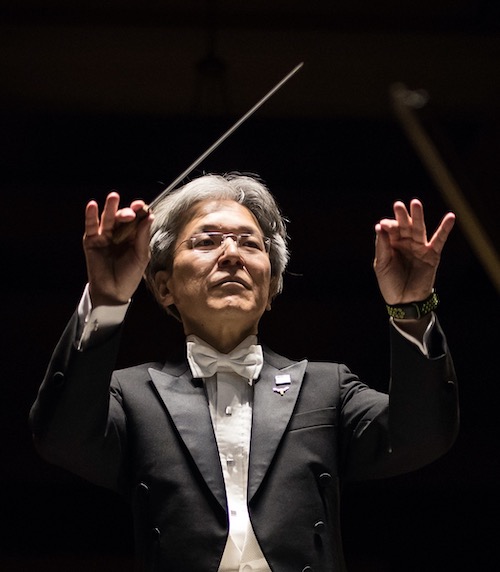Conductor Udagawa brings quiet strength to wide-ranging New England Phil finale

Yoichi Udagawa conducted the New England Philharmonic’s season finale Saturday night at Jordan Hall.
Most successful conductors possess a singular strength of musical vision. Yet some lead with a gentle touch that allows for the music to unfold naturally.
Conductor Yoichi Udagawa makes even the thorniest modern score flow with finesse. With his sensitive yet authoritative style, he led the New England Philharmonic in some of its sharpest playing of the season Saturday night at Jordan Hall.
Saturday’s season finale featured music by Eric Nathan and Witold Lutosławski alongside shorter works by young composers. Udagawa, the final candidate for the NEP directorship, revealed the Technicolor splendor of each piece without ever sacrificing momentum.
That approach revealed the pent-up tension in Nathan’s Double Concerto for Solo Violin, Solo Clarinet, and Strings, heard in its Boston premiere. A co-commission from NEP and the New York Classical Players, the 16-minute work is less a conversation than a fiery argument. Yet it begins serenely as the solo violin offers a silvery line. The music takes on its restless energy when the clarinet enters halfway in.
Violinist Stefan Jackiw and clarinetist Yoonah Kim, the evening’s soloists, rendered their respective parts with abandon. Jackiw’s rapt opening statements were like a mighty cry against the softly dissonant strings. Kim’s clarinet emerged in the musical dialogue warm and subtly at first but growing more confident as the music progressed. The two eventually engaged in a fierce exchange before fading in a final whisper. Throughout, the strings provide stoic complement, and Udagawa’s thoughtful direction made the texture felt as much as heard.
Economical in forces yet simultaneously deft and dramatic, the Double Concerto stands as Nathan’s most significant recent achievement. The audience rewarded the musicians and the composer with generous applause.
Lutosławski’s Concerto for Orchestra also proved a showcase for the conductor and orchestra. Composed between 1950 and 1954, the score is set with neo-Baroque clarity. Yet the music is thoroughly modern, with Polish folk melodies distorted beyond recognition.
Udagawa realized the work’s intricacy and rhythmic thrust. The Intrada was delightfully fitful, with the conductor drawing attention to its fleeting lyricism. Udagawa revealed the impish zeal of the Capriccio, the reading only marred by a few false entrances. He built the energy steadily through each variation of the Passacaglia. The Toccata brought momentary zest, the Chorale a pastoral solace that broke in a final barrage of rhythm.
Short works by TJ Cole, Igor Santos, and Kathryn Salfelder delivered greater contrasts in style and substance.
Cole’s Nightscape, also heard in its Boston premiere, revealed the orchestra’s fullness and dimension in its taut 5 minutes. String glissandos convey mystery as the winds highlight shimmering harmonies. The wash of sound ebbs and flows before fading into silence. Nightscape is music of the moment, and Udagawa crafted a vivid musical canvas.
Santos’s ploy, pivot verges on the otherworldly. Winner of the 2021 NEP call for scores, the 6-minute work recalls the music of Toru Takemitsu in its mix of impressionism and biting dissonance.
Harp and percussion open the work with diffuse plucks and shudders. But the texture soon fills with snarling woodwinds and dusky cello phrases. Calm returns in the final bars, though the tension carries into the ensuing silence. Leading with assurance, Udagawa made a compelling case for Santos’s score in its Boston premiere.
The conductor did the same with Salfelder’s Fanfare for Richard Pittman, heard in its world premiere.
The composer has long been a collaborator with Pittman when he led the NEP and Boston Musica Viva. Her two-minute fanfare reflects his personality, capturing the esprit he brought to each ensemble during his decades-long tenure.
The orchestra’s verve and conviction made the work a fitting tribute to their former conductor, whose presence has been sorely missed this season.
Posted in Performances



